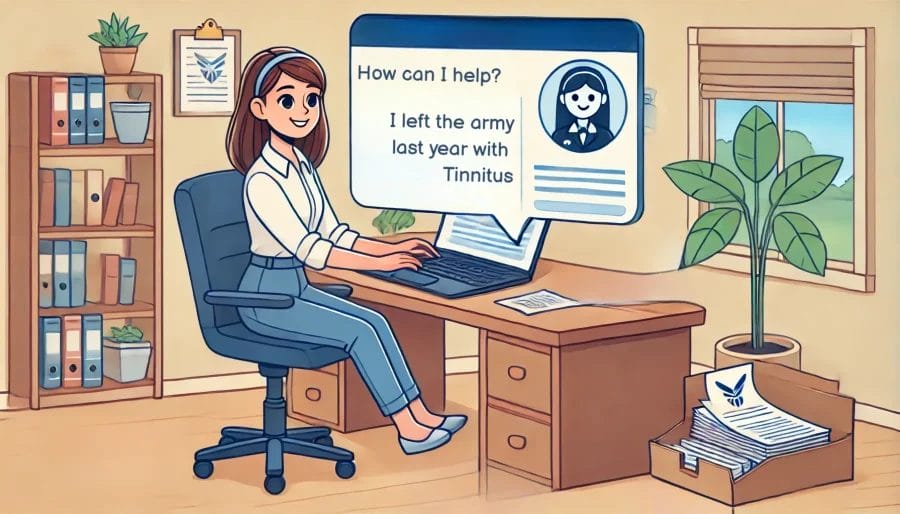Receiving a notice that your VA claim is deferred can be frustrating and confusing.
A deferred claim means that the VA has not yet made a final decision on your disability claim, often because more evidence is needed. In this article, we will explore what to do when your claim is deferred, how long it might take, and what actions you can take to ensure your claim is processed efficiently.
How Long Does a Deferred VA Claim Take?
The timeline for a deferred VA claim can vary depending on the specifics of the case. When the VA defers a decision, it means they need additional information to make a ruling. This could include medical evidence, service records, or more clarification about the condition. Generally, deferred claims can take anywhere from a few months to over a year, depending on how quickly the needed information is provided.
For more information on VA claim processing, visit this guide on filing claims.
AI Powered Chatbot for VA Disability Claims
Learn more about the VA Disability process and get help with our VA Disability Claim Chatbot programmed and trained by AI

What is a VA Deferred Claim?
A deferred VA claim means that the VA has not made a final decision on your disability claim yet. Unlike a denial, which indicates the VA has concluded that your claim does not meet the requirements for compensation, a deferral is essentially a “pause.” The VA needs more information or evidence before they can continue.
Veterans whose claims are deferred should work closely with their representative or legal counsel to provide the necessary documents and expedite the process. If a claim is deferred due to a lack of medical evidence, it’s important to gather those records as soon as possible to avoid further delays.
To understand the exact status of your deferred claim, the VA will typically notify you in writing and outline what additional information is required.
VA Deferred Claim Timeline
The timeline for deferred VA claims can vary, but generally, it falls into these categories:
- Short-term deferrals: If the VA only needs minor information, like missing paperwork, the claim may be resolved within a few months.
- Long-term deferrals: If more extensive medical documentation or service records are needed, it may take up to a year or longer to complete.
It’s important to stay in contact with the VA and ensure that all requested materials are submitted in a timely manner. Veterans are encouraged to use the VA’s disability claim tracking tool to stay updated on the status of their claim.
The Previous Denial of Service Connection is Confirmed and Continued
In some cases, for a VA claim deferred, veterans may receive a notification stating that the previous denial of service connection is confirmed and continued. This means that after a review of the evidence, the VA has decided not to change its prior decision. If this happens, veterans can take several actions:
- File a Notice of Disagreement (NOD): Veterans who disagree with the decision can file an NOD to appeal the ruling.
- Request additional evidence: If more medical or service-related evidence is available, submitting it may result in a different outcome.
- Seek legal assistance: Consulting with a veteran’s law attorney or a VA-accredited representative can help improve the chances of success on appeal.
For more detailed information on how to handle denials and deferred claims, visit this guide on VA disability reviews.

VA Claim Deferred for PACT Act
The passing of the PACT Act has led to many veterans having their claims deferred as the VA works through additional requirements. Claims related to toxic exposure or conditions newly covered under the PACT Act may take longer to process, especially if new evidence or updated medical evaluations are needed.
Veterans should stay patient as the VA continues to process the influx of new claims resulting from this important legislation. If your VA claim was deferred for PACT Act conditions, the VA will notify you if additional documents or examinations are required.
How Long Do Deferred VA Claims Take?
The amount of time it takes for a deferred VA claim to be resolved varies widely. While some claims may be resolved in a matter of months, others may take over a year. If the VA is waiting for specific documents, such as medical evaluations or service records, it’s important to provide them as soon as possible to avoid further delays.
You can track the progress of your deferred claim by using the VA claim tracking tool.
What to Do If Your VA Claim is Deferred?
If your claim is deferred, there are steps you can take to speed up the process:
- Submit missing documents: Ensure that any requested medical evidence, service records, or other documentation is provided to the VA as soon as possible.
- Work with a representative: VA-accredited attorneys or Veterans Service Organizations (VSOs) can help guide you through the deferred claim process and ensure that all required information is submitted.
- Stay in contact with the VA: Regularly check the status of your claim and make sure that the VA has all the information it needs to make a decision.
Veterans who stay proactive during the deferral process can help reduce the time it takes to resolve their claims. Also see this article on how often is a VA claim reviewed.
Deferred VA claims can be frustrating, but understanding the process and knowing what to do can help veterans move their claims forward. Whether your claim was deferred due to the PACT Act or because the VA needs additional evidence, staying engaged and working with a representative can speed up the process.
For more information, veterans can use the VA Disability Calculator to estimate their compensation based on their rating.
